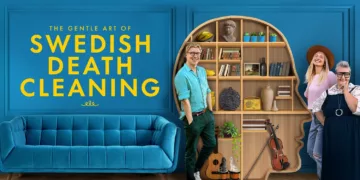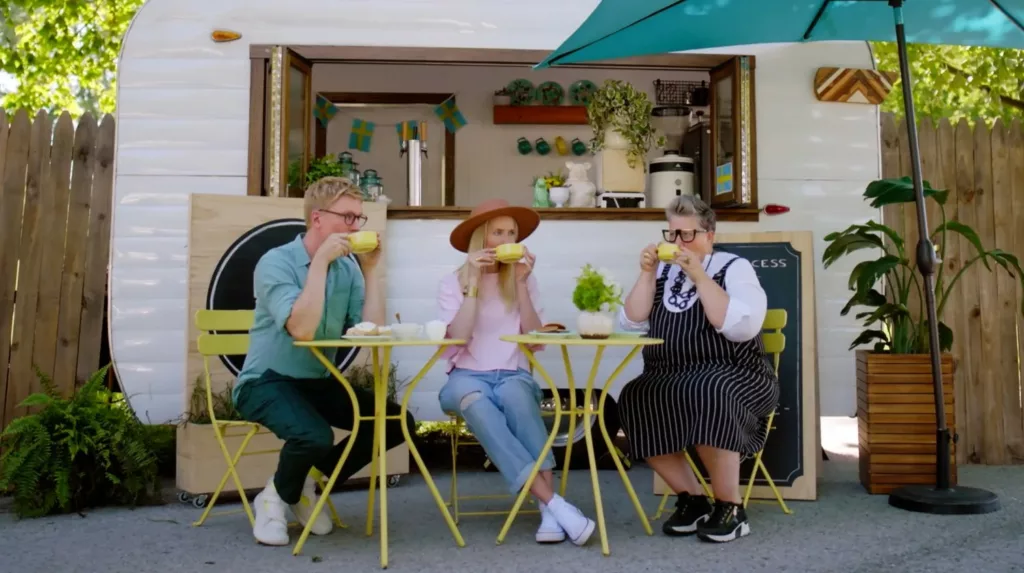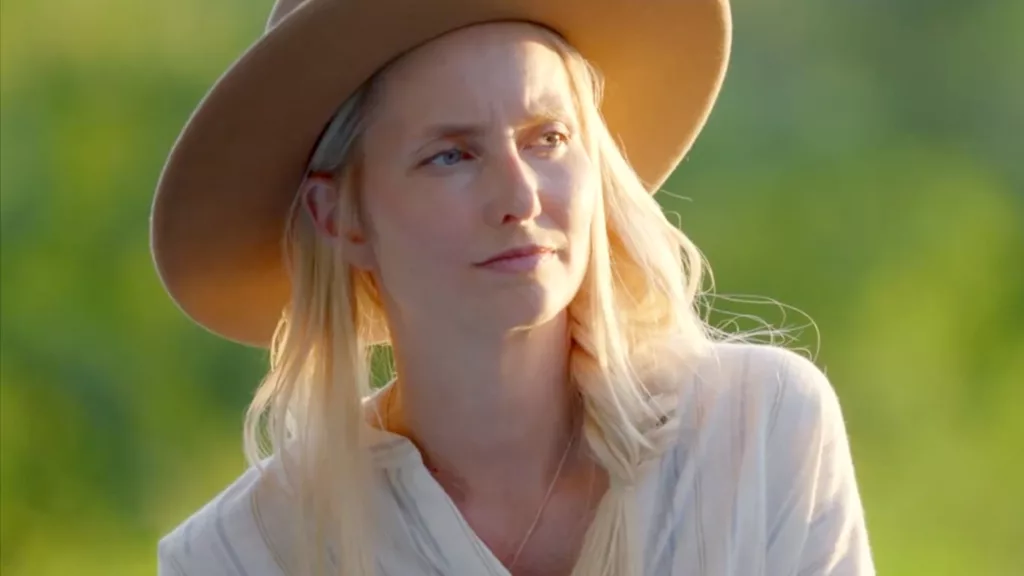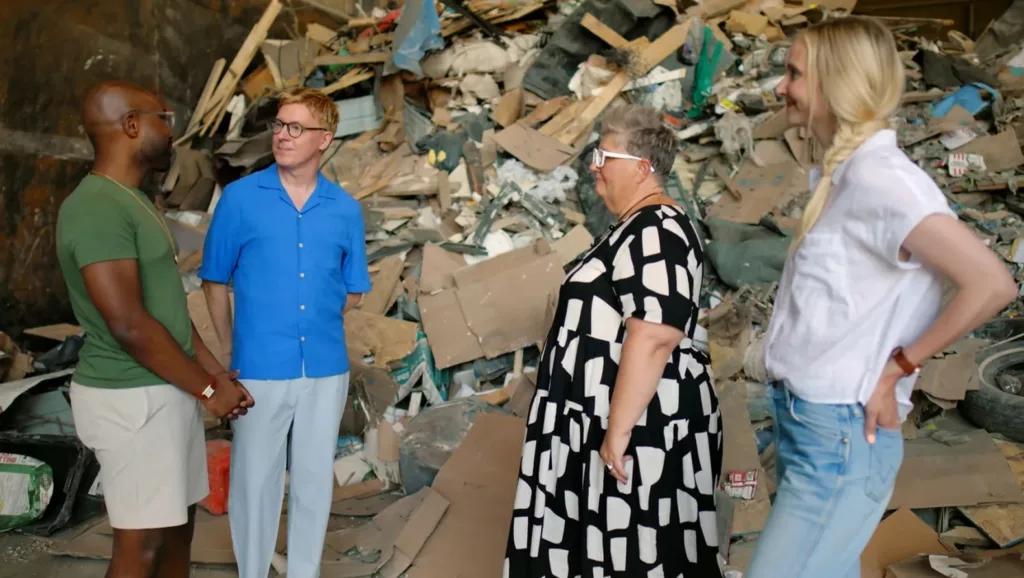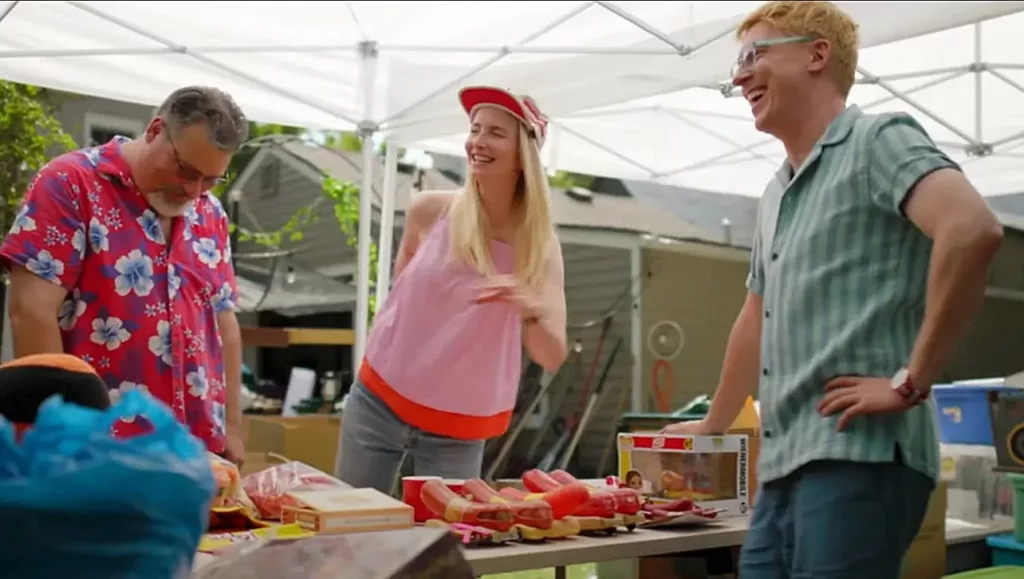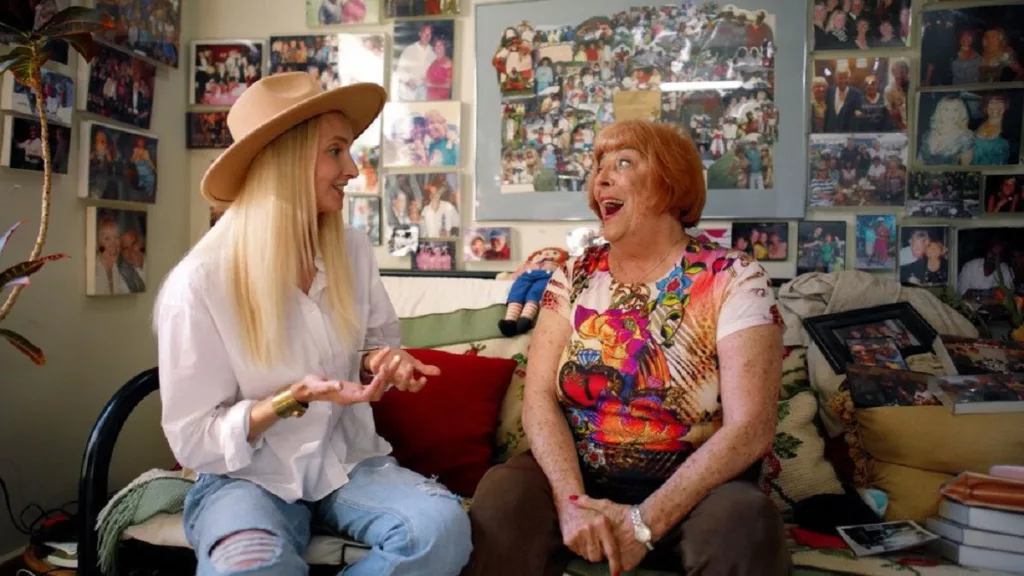The new television series The Gentle Art of Swedish Death Cleaning introduces American audiences to an insightful tradition from Sweden. Based on Margareta Magnusson’s bestselling book of the same name, the show explores the practice of döstädning, or “death cleaning.” In Swedish culture, it’s customary for people to declutter their possessions and put their affairs in order as they age. Rather than dreading the end of life, this process allows one to thoughtfully curate their legacy.
Three experts bring döstädning to America. Ella is a skilled organizer who helps with sorting through belongings. Johan applies his design experience to create orderly, welcoming spaces. As a psychologist, Katarina helps clients uncover what really matters from their past while embracing the future. Their collaboration aims not just to declutter homes but also lives.
The series gives us glimpses into the journeys of eight Americans in different stages of life. From a spunky 75-year-old in Kansas City to a family in Texas facing terminal illness, every story examines how our surroundings impact our well-being. Clients grapple with the attachments and memories symbolized by possessions. With compassion, the Swedish team guides each person to shed excess material and mental clutter.
By spotlighting döstädning, the show advocates living deliberately. Whether we have decades left or face closer mortality, it challenges us to define our legacies. What do we want to remember? What is worth passing on? Decluttering offers an opportunity for renewed clarity and purpose. Above all, The Gentle Art of Swedish Death Cleaning celebrates appreciating each moment as we determine the meaningful from the meaningless in our lives. Its message is one of mindfulness, leaving a leaving a legacy, and making the most of our limited time.
Meetings along the Way
The Gentle Art of Swedish Death Cleaning follows the journeys of eight unique Americans as they work with Swedish decluttering experts. In the premiere, we find Suzi Sanderson, a former showgirl at 75, ready for reinvention. Her Kansas City home resembles a memorabilia museum, yet she feels trapped. Ella, Johan, and Katarina ease her path by donating treasured costumes to drag queens and sorting items symbolizing her past from those representing her future.
Next is Shana, confronting terminal cancer with overwhelming possessions. She strives to create meaningful final moments, buoyed by the cleaners’ candor around mortality. In Dallas, brothers Ryan and Chris inherit a cluttered family home and disagree on the solution. Their session exposes desires to honor legacy versus start fresh.
Lindsey finds her identity restricted by a house of dreary hand-me-downs. Supported by redecorating with vibrancy and whimsy, she rediscovers autonomy. Mother-daughter duo Lisa and Nicole united, clearing the nest in preparation for Lisa’s retirement. Through healing laughter and tears, they solidify their bond independent of things.
A military family downsizes to treat the father’s illnesses. Saying goodbye to a collected life proves bittersweet but relieving. Finally, widow Barbara prepares to sell her sprawling ranch, wavering between clinging to her past love and celebrating full circles. Throughout, an atmosphere of lighthearted wisdom and taking life one touchstone at a time sustains each traveler.
These varyingly aged yet similarly spirited individuals exhibit how we all undergo changes. Defining ourselves through experiences rather than possessions becomes easier with honest guidance. The cleaners gift the art of simplifying not for death alone but for daily fullness too. Their travels suggest life’s journey, as does meeting friends along the way.
Meet the team
Viewers are introduced to the decluttering experts at the heart of each episode’s journey. First is Johan, who brings design savvy and straight talk. The Stockholm native carries himself with humor, referring to a client’s home as a “kingdom of death.” Yet his bluntness stems from care, not cruelty. Johan sees each object’s purpose and helps craft surroundings celebrating life today.
Equipped with yoga know-how and thoughtful queries, Katarina guides deeper reflection. The psychologist navigates sentiment with compassion. Her discussions uncover buried feelings and clarify priorities, permitting peace. Katarina reminds us that while our time is limited, love is timeless. Together, she and Johan ease burdens, both physical and existential.
Finally, viewers meet Ella, whose tidy vision masks a vibrant spirit. The organizer excels at uniting form and function and finds new life for preloved items. Ella draws smiles and chuckles from each client, lightening the occasional solemnity with warmth. She sees potential beyond possessions, empowering all to sculpt the future while honoring the roles of the past.
This balanced trio tackles responsibilities with diverse dexterity. Johan’s candid perspective challenges care. Katarina soothes souls’ storms through still waters. And Ella’s buoyant presence buoys others. Their blend of tactics, when paired with each individual’s readiness for change, proves a recipe for releases that benefit the body and bloom.
Simplicity and the Soul
Beneath cluttered surfaces often lie tangled thoughts, a truth The Gentle Art of Swedish Death Cleaning subtly explores. Each episode centers on cherished objects yet transcends stuff to ponder deeper meaning.
Participants cling tightly to tokens of their past selves, unable to envision life beyond the roles now ended. Memories preserved in minutiae maintain a sturdy grip, restraining the present. Lost in reminiscence, they linger in shadow, neglecting the light still ahead.
Enter the declutterers. Sensitive yet sensible, they gently loosen clinging fingers and clear clouded visions. Questions unfold possessions’ power, revealing roots of reluctance toward easing earthly attachments. Fears of the future’s formless form also factor; the unknown is unsettling even for youths.
By facing fears and memories with open palms instead of fists, participants prove possession’s illusive power. Selves are substance, not surface things. Lives are lived, not archived in aging artifacts. Legacy emerges not from effects but impacts—the way love lived on in loved ones’ lives.
Simplicity surfaces as a pathfinder. Pared possessions create space for novel experiences, room to receive presently instead of remnants from bygone seasons. Lives once heavy feel lilted, liberated from stuff’s pointless burdens. Clients see clearly the calm invitation of clean sheets; a clearing’s peace is more precious than anything obtained.
This gentle series offers a mirrored glimpse into clutter’s complex causes. Its lessons lift lingering loads, revealing richness regardless of rank or remnants. At life’s end, it suggests, sole solace may be a clean conscience and hearts made lighter for having let slip stuff’s inessential empire long before final fingers unfurl.
Rediscovering a sense of self
More than just clean homes emerge from cluttered corners. The Gentle Art channels organization skills to illuminate inner visions obscured by hang-ups from years past. Johan, Ella, and Katarina sensitively guide gazing within past surfaces to find who remains underneath lifelong accumulations, weighting souls unaware.
Katarina sits with clients, sharing stories seldom voiced. Hidden hurts surface with unneeded objects and memories gripping too tightly. Understanding dawns that own satisfaction cannot stem from dead dreams or dusty distractions. Presents matter more than possessions; presence outranks patterns from before. Clients see clinging to past identities as preventing passion pursuit, while present possibilities are pleasantly ahead.
Ella disentangles knots, entangling each item’s sense and significance. Her eyes are gentle objects free from charged past roles to present a refined essence. Some earn encore performances; others accept final farewells. Release lightens burdens while stories linger, securing lessons, not just livelihoods. Johan then crafts spaces celebrating clients reclaimed, revealing a rekindled rapport with reason for being.
Touching transformations take shape. Participants regain bearings as their lives declutter, rediscovering direction amid surroundings that now support the soul instead of showcasing stuff. Clients smile, sensing renewed security within neatened environs, mirroring clarified conviction. Purpose proceeds possessions when the present prevails over the past. The gentle art guides gazing within to glimpse glowing futures by facing feelings first and finding self-sufficiency where only things seemed sure before. Spirit springs revitalized from the skeletons of skins shed, leaving listeners lightened too by such sharings.
Embracing Life’s Inevitabilities
Americans take inspiration from Swedish views, often deemed too frank. Death Cleaners debut discussions many stateside shun, yet ponder profoundly privately. Katarina reminds us that while existence ends similarly worldwide, candor eases journeys’s ends.
Traditions like “death housekeeping” shed light through comparison. Tact belies truths, tempering attachment’s grip and freeing future focus. Observation differs vastly from the wasteful consumerism dominating the US lifestyle. Where abundance saturates landfills, environmentalism saturates the Swedish mindset. Just one percent meeting demise bespeaks prioritizing earth’s endurance across generations.
Contrary opinions assume methodology fits for twilight years alone. Yet routines strengthening spirits appear to be universally healing. One client, Shana, faces terminality bravely through cleaners’ aid. Open dialogue surrounds her passing gifts, tranquility in the time remaining, and familial bonds fortified for eternity.
Lessons transcend ages and status; minimalism’s tranquility crosses borders. Liberation emerges from an unshackling past, pursuing everyday joy. Property proves meager solace; relationships grant purpose. The gentle art guides recognizing life’s brevity through deaths faced and lives embraced. Confronting life’s hardships with candor like the Swedes cultivates clarity and calm, so future paths may blossom like nature reclaimed from the debris of former days.
Mindful Messengers
Within death cleaning’s tranquil tone lies transformative power. Meet Suzi, exuding sixties flair while dwelling in memories, liberated through facing the unknown future. Her wit and zest for living enrich all who witness a soul’s renewal. Similarly, Shana’s candor conveys life’s brevity with grace; her message impacts all those facing health crises, reminding us that each day is a gift.
This series gives perspective yet entertains. Johan, Ella, and Kat escort us to wherever organizing oeuvres deliver laughter. Their tact navigates sensitive terrain; honor in strangers is inherent. Messaging around sustainability resonates, yet imposition is absent. One percent refusing landfills’ waste inspires emulating earth-caring ways, not condemnation for the past’s excess.
Impact eases beyond episodes; minds stay by permanent matters rarely pondered. Each reminiscing over mementos found freedom in futures impossible to outline completely. Might viewers facing closets, too, find solace in simplicity? Lessons teach living without regretting yesterdays and embracing the present through authentic connections versus possessions. Memories preserved in hearts remain forever, alleviating clinging and clearing paths yet unknown.
Death cleaning’s appeal stems from opening lives normally concealed, therein locating shared hopes. May we all discover courage in facing life’s endings, as in its beginnings, with open hands and hearts alive to each moment’s gifts. Such calming keys unlock lives once cluttered in mind and space, fostering conscious paths and legacies that are truly free.
The Review
Gentle Art of Swedish Death Cleaning Season 1
The Gentle Art of Swedish Death Cleaning offers gentle guidance on a universally relevant subject, bringing philosophical musings into accessible focus through compassionately depicted characters. While not reinventing the decluttering genre formula, the series lightheartedly uplifts by honoring life's brevity and humanity's shared capacity for personal growth. Overall, its warmhearted wisdom makes for an inspiring and thought-provoking eight episodes.
PROS
- Heartwarming and inspirational exploration of life's big questions through decluttering journeys
- Likable characters that viewers can relate to and learn from
- Positive messaging around mindfulness, sustainability, and legacy
- Insightful psychological perspectives mixed with decluttering guidance
- Thought-provoking conversations about relationships with possessions
CONS
- Some episodes feel formulaic with similar client situations
- Forced cultural comparisons between Sweden and the US distract at times
- Pacing is slow without enough substance to fill full episodes
- Overreliance on client interviews limits the visuals of actual cleaning
